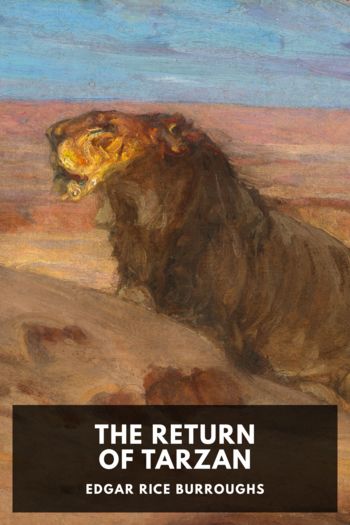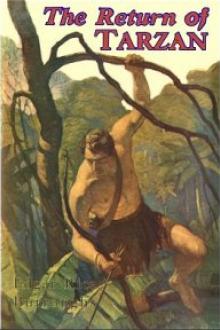The Return of Tarzan by Edgar Rice Burroughs (read any book txt) 📕

- Author: Edgar Rice Burroughs
Book online «The Return of Tarzan by Edgar Rice Burroughs (read any book txt) 📕». Author Edgar Rice Burroughs
“Leave the ivory!” he cried. “Leave the ivory! Dead men have no use for ivory!”
Some of the Manyuema started to lay down their loads, but this was altogether too much for the avaricious Arabs. With loud shouts and curses they aimed their guns full upon the bearers, threatening instant death to any who might lay down his load. They could give up firing the village, but the thought of abandoning this enormous fortune in ivory was quite beyond their conception—better death than that.
And so they marched out of the village of the Waziri, and on the shoulders of their slaves was the ivory ransom of a score of kings. Toward the north they marched, back toward their savage settlement in the wild and unknown country which lies back from the Kongo in the uttermost depths of The Great Forest, and on either side of them traveled an invisible and relentless foe.
Under Tarzan’s guidance the black Waziri warriors stationed themselves along the trail on either side in the densest underbrush. They stood at far intervals, and, as the column passed, a single arrow or a heavy spear, well aimed, would pierce a Manyuema or an Arab. Then the Waziri would melt into the distance and run ahead to take his stand farther on. They did not strike unless success were sure and the danger of detection almost nothing, and so the arrows and the spears were few and far between, but so persistent and inevitable that the slow-moving column of heavy-laden raiders was in a constant state of panic—panic at the uncertainty of who the next would be to fall, and when.
It was with the greatest difficulty that the Arabs prevented their men a dozen times from throwing away their burdens and fleeing like frightened rabbits up the trail toward the north. And so the day wore on—a frightful nightmare of a day for the raiders—a day of weary but well-repaid work for the Waziri. At night the Arabs constructed a rude boma in a little clearing by a river, and went into camp.
At intervals during the night a rifle would bark close above their heads, and one of the dozen sentries which they now had posted would tumble to the ground. Such a condition was insupportable, for they saw that by means of these hideous tactics they would be completely wiped out, one by one, without inflicting a single death upon their enemy. But yet, with the persistent avariciousness of the white man, the Arabs clung to their loot, and when morning came forced the demoralized Manyuema to take up their burdens of death and stagger on into the jungle.
For three days the withering column kept up its frightful march. Each hour was marked by its deadly arrow or cruel spear. The nights were made hideous by the barking of the invisible gun that made sentry duty equivalent to a death sentence.
On the morning of the fourth day the Arabs were compelled to shoot two of their blacks before they could compel the balance to take up the hated ivory, and as they did so a voice rang out, clear and strong, from the jungle: “Today you die, oh, Manyuema, unless you lay down the ivory. Fall upon your cruel masters and kill them! You have guns, why do you not use them? Kill the Arabs, and we will not harm you. We will take you back to our village and feed you, and lead you out of our country in safety and in peace. Lay down the ivory, and fall upon your masters—we will help you. Else you die!”
As the voice died down the raiders stood as though turned to stone. The Arabs eyed their Manyuema slaves; the slaves looked first at one of their fellows, and then at another—they were but waiting for someone to take the initiative. There were some thirty Arabs left, and about one hundred and fifty blacks. All were armed—even those who were acting as porters had their rifles slung across their backs.
The Arabs drew together. The sheik ordered the Manyuema to take up the march, and as he spoke he cocked his rifle and raised it. But at the same instant one of the blacks threw down his load, and, snatching his rifle from his back, fired point-blank at the group of Arabs. In an instant the camp was a cursing, howling mass of demons, fighting with guns and knives and pistols. The Arabs stood together, and defended their lives valiantly, but with the rain of lead that poured upon them from their own slaves, and the shower of arrows and spears which now leaped from the surrounding jungle aimed solely at them, there was little question from the first what the outcome would be. In ten minutes from the time the first porter had thrown down his load the last of the Arabs lay dead.
When the firing had ceased Tarzan spoke again to the Manyuema:
“Take up our ivory, and return it to our village, from whence you stole it. We shall not harm you.”
For a moment the Manyuema hesitated. They had no stomach to retrace that difficult three days’ trail. They talked together in low whispers, and one turned toward the jungle, calling aloud to the voice that had spoken to them from out of the foliage.
“How do we know that when you have us in your village you will not kill us all?” he asked.
“You do not know,” replied Tarzan, “other than that we have promised not to harm you if you will return our ivory to us. But this you do know, that it lies within our power to kill you all if you do not return as we direct, and are we not more likely to do so if you anger us than if you do as we bid?”
“Who are you that speaks the tongue of our Arab masters?” cried the Manyuema





Comments (0)